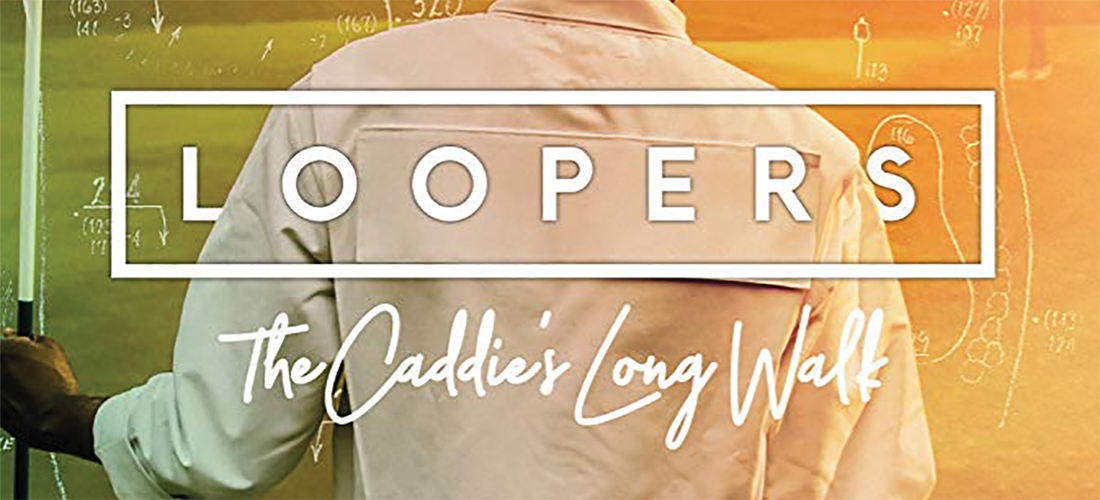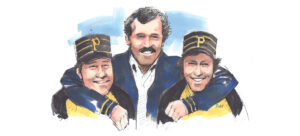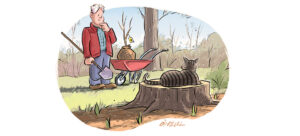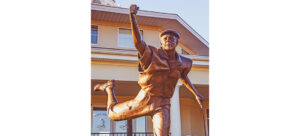
In the Loop
No Pinehurst but plenty of character
By Lee Pace
Had the producers of the new film Loopers: The Caddie’s Long Walk been able to get to Pinehurst to interview some of the men who have toted golf bags on the venerable No. 2 course, they could have heard Thomas Trinchitella speak of working for former President George H.W. Bush for two days in 2003, or carrying for Tiger Woods for two rounds prior to the 2005 U.S. Open.
“This was the week before the Open,” Trinchitella, who has been caddying at Pinehurst since 2001 and is one of 18 members of the Pinehurst Caddie Hall of Fame, would have told them. “Tiger gave (regular caddie) Steve Williams the week off. We go off at 7 a.m. and the fog’s so thick I can’t tell where the flag is on the first green. I knew it was middle or back. So I give him the back yardage.
“I’m sweating walking up to the green. We get there and I see his ball 20 feet left of the flag. It was the right yardage, just left. That just determines whether he’s going to believe what you say or whether you’re just the bag-toter. He just went by my yardage the rest of the day. It was a great experience. He talked about anything and everything. Couldn’t have been nicer.”
Had they gotten to Willie McRae before his death in October 2018, McRae could have regaled them with stories of 75 years of caddying and strolling the fairways with five presidents, baseball great Mickey Mantle, basketball icon Michael Jordan, and golf hall of famers Gene Sarazen and Sam Snead. He could have shared some of his favorite one-liners, like the one when a putt had a chance to fall but veered off at the end.
“That was a mother-in-law. It looked good leaving,” McRae liked to say to guffaws all around.
Alas, the producers made it to Scotland and Ireland, to Pebble Beach, Bandon Dunes and Augusta National. But not to Pinehurst, where men carrying golf bags have been part of the landscape since the late 1880s.
“It would have been great to get to Pinehurst,” says Ward Clayton, one of the producers. “But in the end, we could only get to so many people. There are so many great stories about caddies all over the country.”
The Loopers documentary opened in early 2019 and by early summer had been seen in 30 states across the country and in the United Kingdom. The one-hour, 20-minute film will be out on DVD in late August and is available for golf clubs to rent for private showings. Actor and comedian Bill Murray, who starred in the 1980 movie Caddyshack and caddied as a boy in Illinois, narrates the lively film that traces the history of the caddie and his evolution through centuries of the game.
“What a great tribute to a profession that is so important to the game of golf,” Pinehurst President Tom Pashley told a group of resort caddies after a showing in June at the Sunrise Theater in Southern Pines. “We absolutely recognize how important the four or five hours you spend with a player is to their overall experience at Pinehurst. We celebrate the tradition of the player-caddie relationship.”
The film is the union of ideas and passions from two golfers from opposite sides of the country.
Jim Packer had spent 25 years making movies in Hollywood (Jersey Boys, Winter’s Tale of recent note) and in his spare time playing golf at Bel-Air Country Club in Los Angeles and developing a close relationship with his regular caddie.
Clayton, a native of Durham who has spent his career in golf journalism and public relations, developed a reservoir of stories about old-time Augusta caddies and the Masters Tournament when he was sports editor of The Augusta Chronicle from 1991-2000. He turned those tales of colorful characters with nicknames like Iron Man, Pappy, Cemetery and Stovepipe into a 2004 book, Men on the Bag: The Caddies of Augusta National.
Packer thought there was a story to tell, that caddies had never been properly saluted in a quality, full-length documentary. Reading Clayton’s book helped further develop the idea.
“Jim always thought that caddies got the short straw — what they do, how they deal with people in guiding them around the golf course and interacting with them psychologically — he felt that story needed more depth and could be told,” Clayton says. “The intention of this was not only for the people that are golfers, but for people who are outside of golf, to understand what role the caddie has and what they do. If you think of any sport, it’s the only one where you have somebody standing right beside you when you hit your shot.”
They hired a team of directors, cameramen, writers and editors to produce the film, Packer as executive producer and Clayton a producer.
“The essential message of the film is this: If you’ve never played a round of golf with a caddie, you’re missing out,” says Clayton, today a PR and communications consultant in Jacksonville, Florida. “I don’t know what percentage of golfers have ever played with a caddie. I was 17 or 18 when I first had a caddie. I was with some friends from Durham in Pinehurst and we got on No. 2 and took caddies. It was an awesome experience.”
The film tells the story of loopers at esteemed clubs like St. Andrews, Carnoustie and Prestwick in Scotland, and Ballybunion and Lahinch in Ireland. It tells of Arnold Palmer’s relationship with Augusta caddie Nathaniel “Iron Man” Avery and interviews Fuzzy Zoeller about how he won the 1979 Masters playing at Augusta for the first time with the help of a local caddie named Jariah “Jerry” Beard.
It explores Ben Crenshaw’s relationship with Augusta caddie Carl Jackson, Nick Faldo’s with Fanny Sunesson and Tom Watson’s with Bruce Edwards. Other professional caddies interviewed include Williams (Woods’ former caddie), Pete Bender (Greg Norman and others) and Michael Greller (Jordan Spieth).
The movie traces the evolution of the Evans Scholars Program, in which high school caddies can earn college scholarships, and ferrets out lesser-known tales like that of Greg Puga, who grew up in East Los Angeles, learned to caddie at Bel-Air, and rode the passion he developed for golf into eventually qualifying as an amateur to play in the Masters.
Clayton says one of the most gratifying elements of working on the film was taking the sad tale of a long-deceased Augusta caddie and doing him a good turn.
“Iron Man” Avery caddied for Palmer at Augusta until the late 1960s and was on the bag for all four of Palmer’s Masters wins (1958, ‘60, ‘62, 64). But in later years, Avery had a difficult life, died in 1985 at the age of 46, and was buried in Augusta in an unmarked grave. Through the process of making the film, Clayton was able to find a donor who contributed funds to have a grave marker produced and placed on Avery’s grave.
“For 37 years his grave went unmarked,” Clayton says. “Now it has a headstone with his name and lists his Masters wins with Arnold Palmer. It’s the coolest thing.”
The film makes a concerted effort to challenge the old saw that a caddie’s job is to “Show up, shut up and keep up.” Michael Collins, a former PGA Tour caddie now an ESPN reporter, says, “If that’s all a player sees in his caddie, he’s not winning today.” By probing under the surface of the relationships of top professionals and their caddies, the message comes across loudly that the caddie is so much more at the top level of the game — part psychologist, friend, servant, conversationalist and swing coach.
Of course, it’s a little more basic on the one-off resort level like Pinehurst.
“That’s the old standard, right?” says Trinchitella of that simplistic definition of a caddie’s job. “It’s not a bad policy until you figure out what your player wants. The first thing you do is help them relax and feel comfortable. On No. 2, everyone’s nervous on the first tee. First, it’s a famous golf course. And second, you’ve got someone else watching your golf game. A lot of people aren’t used to that if they’re a 20 or 25 handicapper.
“You just try to get them to relax. There’s nothing I haven’t seen and nowhere I haven’t been.” PS
Lee Pace has written about the Pinehurst golf scene for more than 30 years. For more information on the movie and its availability in theaters, go to loopersmovie.com. Clubs and golf associations can set up private showings by clicking loopersmovie.com/request-a-screening.





